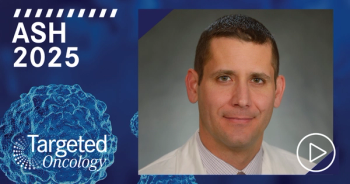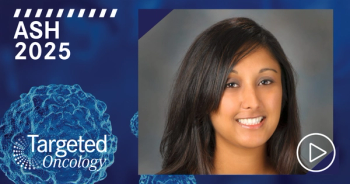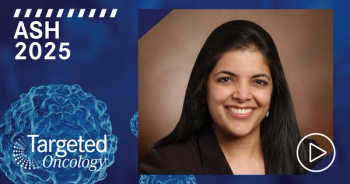
Novel Engineered CAR T Cells Show Early Promise in CD19+ B-Cell Malignancies
Chimeric antigen receptor T-cell therapy with the novel agent CTX110 showed promising early efficacy and safety as treatment of patients with relapsed or refractory CD19-positive B-cell malignancies who were treated in the phase 1 CARBON clinical trial.
Chimeric antigen receptor (CAR) T-cell therapy with the novel agent CTX110 showed promising early efficacy and safety as treatment of patients with relapsed or refractory CD19-positive B-cell malignancies who were treated in the phase 1 CARBON clinical trial (NCT04035434), CRISPR Therapeutics announced in a press release.
The study is a 2-part dose-escalation and dose-expansion study of 131 patients who will be treated with the allogeneic CRISPS-Cas9-Engineered T cells. Topline data are available for 11 patients from the study.
"From this early data read-out, CTX110 has shown dose-dependent efficacy and response rates that are comparable to the early autologous CAR-T trials. Furthermore, CTX110 had an acceptable safety profile, which could make CAR-Ts more widely accessible,” stated Joseph McGuirk, DO, professor of Medicine and Division Director of Hematologic Malignancies and Cellular Therapeutics at the University of Kansas Medical Center and investigator in the Phase 1 CARBON trial of CTX110. “While longer follow-up is required, these early data support the potential for CTX110 to become an effective off-the-shelf CAR-T therapy for patients with relapsed or refractory B-cell malignancies.”
Of the 11 patients evaluated for clinical activity, 3 received 30 x 106 CAR T cells (Dose level [DL] 1), another 3 received 100 x 106 CAR T cells (DL2), 4 received 300 x 106 CAR T cells (DL3), and 1 received 600 x 106 CAR T cells (DL4). Patients were aged 18 years of older with relapsed/refractory disease, an ECOG performance status of 0 or 1, as well as adequate renal, liver, cardiac and pulmonary function.
Although CTX110 did not induce an objective response rate (ORR) at DL1, the ORR was 33% in the DL2 cohort. In addition, the DL3 cohort had an ORR of 50%, and the DL4 cohort achieved an ORR of 100%. All the responses observed were complete responses (CRs).
Notably, in the 4 patients who achieved a CR, extranodal disease was completely resolved to a normal size of 1.5 cm or smaller. The Deauville score in these patients also dropped to 2 or lower and lymphoblasts in the 1 patient with a score of 30% was cleared after treatment with CTX110.
The early benefit of CTX110 in relapsed/refractory CD19-positive B-cell malignancies was observed in patients with diffuse large B-cell lymphoma and follicular lymphoma, as well as patients who were primary refractory and relapsed after autologous stem cell transplant.
A significant amount of time following infusion with novel CAR T cell product, it was still detected in the patients from the DL2 cohort. The peak expansion was 1 to 2 weeks. The latest time point in which CAR T cells were detected in patients was 180 days post-infusion.
In terms of the second primary end point, safety, 10 patients from cohorts 1-3 were evaluated for incidences of dose-limiting toxicities (DLTs).No DLTs were observed in the study. Common reactions associated with CTX110 such as graft-vs-host disease and infusion-related reactions were also not observed in this study. Cytokine release syndrome (CRS) was observed, however, in 30% of the evaluable patients. The CRS events wereall grade 2 or lower and were resolved with the use of tocilizumab. A case of grade 2 Immune Effector Cell-Associated Neurotoxicity Syndrome occurred but was improved within 24 hours after standard interventions were made.
In terms of serious adverse events (AEs) that were not dose limiting, there was one case of periorbital cellulitis and 1 case of febrile neutropenia. These AEs were resolved and were not found to be related to disease progression or the study drug.
One patient from cohort 4 was evaluated for safety. A DLT of grade febrile neutropenia in this patient led to short-term memory loss and confusion. Eventually, this patient’s symptoms worsened, causing significant obtundation that required intubation. After being treated for the SL with steroids, anakinra and intrathecal chemotherapy, the patient’s condition did not improve. Later, this patient was diagnosed with human herpesvirus 6 (HHV-6), and HHV-6 encephalitis, for which the patient received antiviral therapy. After the patient was withdrawn from supportive care, the patient died 52 days post infusion with CTX110.
These findings are the beginning of the data that will be reported for this ongoing study. Data from assessments of the secondary end points, which include duration of response, progression-free survival, and overall survival are not mature.
“We are highly encouraged by today’s data, which demonstrate the promise of allogeneic therapies in treating hematological malignancies,” said Samarth Kulkarni, PhD, Chief Executive Officer of CRISPR Therapeutics, in a statement. “Over time, we believe CRISPR-edited allogeneic CAR-T has the potential to leapfrog autologous CAR-T and benefit much broader patient populations. We continue to enroll patients and look forward to additional data read-outs for this program as well as our other allogeneic CAR-T programs, CTX120™ and CTX130™, next year. We are grateful to the patients and investigators who have made this important research possible.”
References:
CRISPR Therapeutics reports positive top-line results from its phase 1 carbon trial of ctx110™ in relapsed or refractory cd19+ b-cell malignancies. News release. CRISPR Therapeutics. October 21, 2020. Accessed October 22, 2020.




















